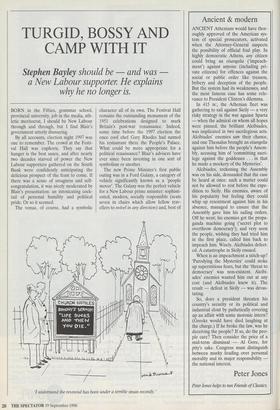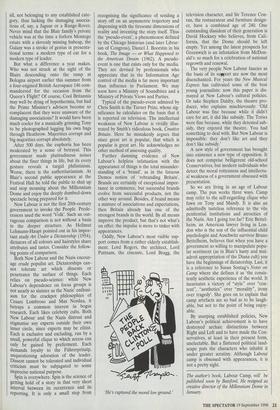TURGID, BOSSY AND CAMP WITH IT
Stephen Bayley should be — and was -
a New Labour supporter. He explains why he no longer is.
BORN in the Fifties, grammar school, provincial university, job in the media, ath- letic meritocrat, I should be New Labour through and through, but I find Blair's government utterly dismaying.
By all accounts, election night 1997 was one to remember. The crowd at the Festi- val Hall was euphoric. They say that hunger is the best sauce, and after nearly two decades starved of power the New Labour supporters gathered on the South Bank were confidently anticipating the delicious prospect of the feast to come. If there was a sense of smugness and self- congratulation, it was nicely moderated by Blair's presentation: an intoxicating cock- tail of personal humility and political pride. Or so it seemed.
The venue, of course, had a symbolic character all of its own. The Festival Hall remains the outstanding monument of the 1951 celebrations designed to mark Britain's post-war renaissance. Indeed, some time before the 1997 election the once cool chef Gary Rhodes had named his restaurant there the People's Palace. What could be more appropriate for a political renaissance? Blair's advisers have ever since been investing in one sort of symbolism or another.
The new Prime Minister's first public outing was in a Ford Galaxy, a category of vehicle significantly known as a 'people mover'. The Galaxy was the perfect vehicle for a New Labour prime minister: sophisti- cated, modern, socially responsible (seats seven in chairs which allow fellow trav- ellers to swivel in any direction) and, best of `I understand the reverend has been under a terrible strain recently.' all, not belonging to any established cate- gory, thus lacking the damaging associa- tions of, say, a Jaguar or a Range-Rover. Never mind that the Blair family's private vehicle was at the time a forlorn Montego estate with a slovenly missing hubcap, the Galaxy was a stroke of genius in presenta- tional terms: a modern type of car for a modern type of leader.
But what a difference a year makes. Who was not struck at the sight of the Blairs descending onto the ramp at Bologna airport earlier this summer from a four-engined British Aerospace 146 com- mandeered for the occasion from the Queen's Flight? Of course, Cool Britannia may well be dying of hypothermia, but had the Prime Minister's advisers become so complacent that they were unaware of the damaging associations? It would have been much cooler for a manically grinning Tony to be photographed lugging his own bags through Heathrow. Majorities corrupt and big majorities corrupt absolutely.
After 500 days, the euphoria has been moderated by a sense of betrayal. This government made platitudinous noises about the finer things in life, but its every gesture reveals a turgid philistinism. Worse, there is the authoritarianism. At Blair's second public appearance at the Festival Hall he told the public to shut up and stop moaning about the Millennium Dome and enjoy the deeply dumbed-down spectacle being prepared for it. New Labour is not the first 20th-century gOvernment to invoke the People. Prede- cessors used the word 'Volk'. Such an out- rageous comparison is not without a basis in the deeper structure. As Hellmut Lehmann-Haupt pointed out in his impor- tant study Art Under a Dictatorship (1954), dictators of all colours and hairstyles share attributes and tastes. Consider the follow- ing points of comparison. Both New Labour and the Nazis encour- age crude populist art. Dictatorships can- not tolerate art which dissents or penetrates the surface of things. Each relies on pseudo-science: while New Labour's dependence on focus groups is not nearly so sinister as the Nazis' enthusi- asm for the crackpot philosophies of Cesare Lombroso and Max Nordau, it betrays a common interest in bogus research. Each likes celebrity cults. Both New Labour and the Nazis distrust and stigmatise any experts outside their own inner circle, since experts may be elitist. Each is exclusive and excluding, run by a small, powerful clique to which access can only be gained by preferment. Each demands loyalty to the Fiihrerprinzip, unquestioning adoration of the leader. Dissent cannot be tolerated and individual criticism must be subjugated to some imprecise national purpose. Spin is everywhere. Spin is the science of getting hold of a story in that very short interval between its occurrence and its reporting. It is only a small step from recognising the significance of sending a story off on an asymmetric trajectory and dispensing with the tiresome dimensions of reality and inventing the story itself. Thus the 'pseudo-event', a phenomenon defined by the Chicago historian (and later Librar- ian of Congress), Daniel J. Boorstin in his book, The Image — or What Happened to the American Dream (1962). A pseudo- event is one that exists only for the media. They are devised by professionals who appreciate that in the Information Age control of the media is far more important than influence in Parliament. We may soon have a Ministry of Soundbites and a Ministry of Private Views and Parties.
Typical of the pseudo-event admired by Chris Smith is the Turner Prize, whose sig- nificance he calculates on the basis that it is reported on television. The intellectual weakness of New Labour is vividly illus- trated by Smith's ridiculous book, Creative Britain. Here he mistakenly argues that since great art is popular, that which is popular is great art. He acknowledges no other method of assessing quality.
Further damning evidence of New Labour's helpless infatuation with the appearance of things is the total misunder- standing of a 'brand', as in the fatuous Demos notion of `rebranding Britain'. Brands are certainly of exceptional impor- tance in commerce, but successful brands evolve from successful products, not the other way around. Besides, if brand means a mixture of associations and expectations, then Britain already has one of the strongest brands in the world. By all means improve the product, but that's not what's on offer: the impulse is more to tinker with appearances.
Oddly, New Labour's most visible sup- port comes from a rather elderly establish- ment. Lord Rogers, the architect, Lord Puttnam, the cineaste, Lord Bragg, the He's captured the moral low ground.' television character, and Sir Terence Con- ran, the restaurateur and furniture design- er, have a combined age of 240. One outstanding dissident of their generation is David Hockney who believes, from Cali- fornia, that the Dome should be left empty. Yet among the latest prospects for Greenwich is an infestation from McDon- ald's: so much for a celebration of national regrowth and renewal.
The very people New Labour fancies as the basis of its support are now the most disenchanted. For years the New Musical Express has cultivated some of the best young journalists: now this paper is dis- mayed at New Labour's cultural policies. Or take Stephen Daldry, the theatre pro- ducer, who explains mischievously: 'Old Labour was fine .because while it didn't care for art, it did like subsidy. The Tories were fine because, while they detested sub- sidy, they enjoyed the theatre. You had something to deal with. But New Labour is impossible: they don't like art and they don't like subsidy.'
A new style of government has brought into existence a new type of opposition. It does not comprise belligerent old-school Conservatives, but modern individuals who detect the moral rottenness and intellectu- al weakness of a government obsessed with presentation.
So we are living in an age of Labour camp. The pun works three ways. Camp may refer to the self-regarding clique who fawn on Tony and Mandy. It is also an admittedly tasteless reference to the vile penitential institutions and atrocities of the Nazis. Am I going too far? Eric Bettel- heim, an American lawyer living in Lon- don who is the son of the influential child psychologist and Auschwitz survivor Bruno Bettelheim, believes that when you have a government so willing to manipulate popu- lar sentiment (as in Blair's hasty and mal- adroit appropriation of the Diana cult) you have the beginnings of dictatorship. Last, it is a reference to Susan Sontag's Notes on Camp where she defines it as 'the consis- tently aesthetic experience of the world. It incarnates a victory of "style" over "con- tent", "aesthetics" over "morality", irony over tragedy'. She goes on to explain that camp artefacts are so bad as to be laugh- able, but not to the point of being enjoy- able.
By usurping established policies, New Labour's political achievement is to have destroyed archaic distinctions between Right and Left and to have made the Con- servatives, at least in their present form, unelectable. But a flattened political land- scape puts the characters who inhabit it under greater scrutiny. Although Labour camp is obsessed with appearances, it is not a pretty sight.
The author's book, Labour Camp, will be published soon by Batsford. He resigned as creative director of the Millennium Dome in January.











































































 Previous page
Previous page